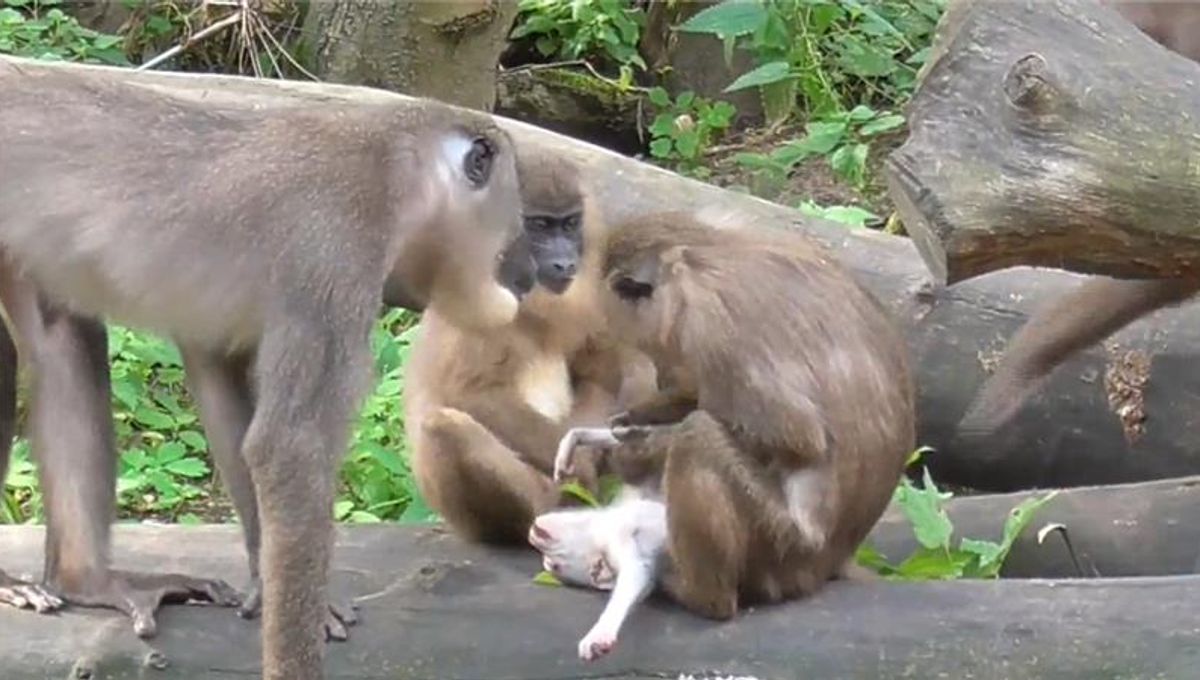
A monkey was recently seen carrying the body of her dead baby for some time after it died. However, she later ate the corpse in a case of primate cannibalism. As unpleasant as this sounds, this unusual behavior may have evolutionary benefits that impact the mother’s chances of reproducing in the future.
The monkey in question is a female drill (Mandrillus leucophaeus), a little-studied and endangered species. This drill, called Kumasi, gave birth to a son at the Dvůr Králové safari park in the Czech Republic on August 24, 2020. The infant did not appear to be healthy, however, and eight days later, observers realized it had died from unknown causes.
Initially, the mother kept the corpse with her and continued interacting with it as if it were alive. Similarly, other monkeys tried to engage with the deceased baby by gazing into its eyes. Then, two days after the infant’s death, Kumasi started to devour its remains until the body was taken away by the keepers. Interestingly, no other monkeys fed on the remains.
While this grisly scene may be disturbing, it nevertheless provides vital information about animal behavior. The study of death-related phenomena in non-human animals forms part of what is called “comparative thanatology”, which examines various responses toward a body. In this case, the fates of the infant monkey and its mother were captured by researchers who were studying the drill troop at the time.
“This is the first report of post-mortem carrying and cannibalism of an infant in a captive group of drills,” the team wrote.
They have now published their observations in a new paper, which includes videos of Kumasi carrying and grooming her infant, as well as other monkeys trying to interact with it. They also show her behavior shifting and finally her eating the remains.
Viewers should be advised that the footage contains material that some may find disturbing.
It is unclear what the motivations behind Kumasi’s initial responses were. It is possible she was grieving the loss, but the researchers seem to think it is likely she did not understand what had happened or was in a state of denial.
Throughout this phase, what they call the “post-mortem phase”, Kumasi and other members of the troop tried to look into the baby’s eyes, while Kumasi also tried to keep the body away from males.
“Monkeys and apes often inspect the face of their dead babies like this, possibly to perceive the eye movements,” study co-author Elisabetta Palagi, a primate biologist at the University of Pisa, Italy, told Live Science. “When the mothers do not receive any feedback from the baby, it probably means that something is going wrong.”
After a few days, Kumasi became more aggressive and was seen throwing the baby’s body around the enclosure before eventually starting to eat it in the “post-mortem cannibalism” phase. While we may be horrified by these acts, Palagi and her colleagues believe they may have specific purposes driving them.
“As described in other species, corpse-directed behaviors shown by the adult male and other drills in our study group included grooming, gazing, sniffing, touching, and dragging. Some authors suggest that these actions may serve to test the corpse’s responsiveness”, the team wrote.
When it comes to the act of cannibalism, this too could have benefits for the mother. “Cannibalism may appear an adaptive evolutionary trait if we consider the high reproductive energy investment of primate mothers. Recovering energy after gestation can improve the mother’s reproductive success.”
In particular, the “absence of sharing the carcass with other group members by the drill mother supports the hypothesis of the nutritional benefit of cannibalism”.
Other factors that are important to consider include the health state of the infant and how soon it died. The younger the baby, the less time the mother has had to form attachments to it, attachments that may otherwise preclude maternal cannibalism in the case of an infant’s death.
“Although we cannot draw any firm conclusions about motivation or potential benefits of the mother’s behaviors”, the team added, “publication of these types of events are important for both quantitative and qualitative evaluations of the wide range of reported post-mortem behaviors”.
The study is published in Primates.
Source Link: Monkey In Zoo Eats Baby’s Corpse In Rare Example Of Primate Cannibalism